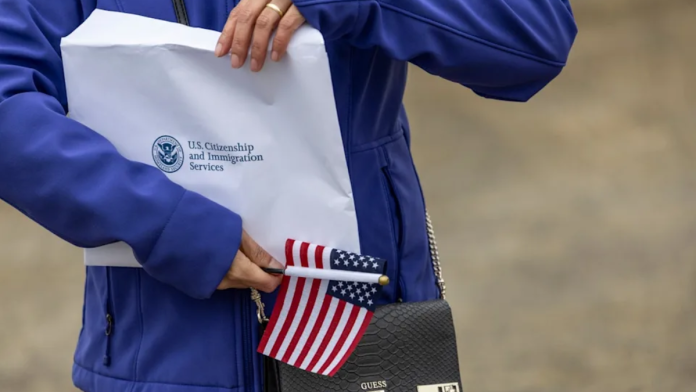Some immigrants applying for green cards through marriage or family could now face deportation, according to new guidance from the U.S. Citizenship and Immigration Services (USCIS). The policy, which took effect immediately, allows the government to place certain applicants into removal proceedings—even if they are following the legal process.
USCIS Issues Policy That May Lead to Deportation for Some Green Card Applicants
The new policy targets immigrants who do not currently have legal immigration status in the United States. These may include individuals who entered the country without authorization or who overstayed their visas.
USCIS clarified that applying for a green card through a U.S. citizen spouse or family member does not offer legal protection from removal. The updated guidance emphasizes that submitting an I-130 petition—often the first step in the green card process—does not give the applicant any legal status while they wait.
🌍 America’s welcome gets a price tag — $15K visa bond targets “overstay nations”
This change applies to both new and already pending applications, including those filed before August 1.
Nearly Half a Million Applicants Could Be Impacted
Over 520,000 I-130 petitions were filed in the first six months of 2025 alone, according to USCIS data. By June, there were more than 2.4 million pending petitions, with over 1.9 million waiting for more than six months.
It is unknown how many applicants currently lack legal status or have fallen out of status during the wait. However, the new guidance is expected to impact a large number of individuals and families trying to adjust their status.
In the past, applicants who were married to U.S. citizens or had family sponsors were rarely referred to immigration court unless they had committed serious offenses. Elora Mukherjee, director of the Immigrants’ Rights Clinic at Columbia Law School, called the change “very broad” and warned that it could lead to immigrants being placed in removal proceedings “at any point in the process.”
🔍 Hidden power shift? China-Argentina relations deepen under cover of visa reform
Mukherjee also noted that this shift could create fear among immigrant families, especially those who are trying to follow the law and pursue legal status. Even Dreamers, visa overstayers, and people who lost protection under previously existing legal programs may now be at risk.
Julia Gelatt, associate director at the Migration Policy Institute, said the change aligns with the Trump administration’s efforts to expand deportations. “They’re sending a message that even people trying to stay legally may need to leave,” she said.
USCIS Says the Policy Aims to Fight Fraud and Enforce Laws
In a public statement, USCIS said the update is meant to improve integrity in the immigration system. The agency stated that family-based petitions do not guarantee any form of immigration status and that applicants can still be removed from the U.S. during the process.
US Embassy Flags Indian Student Over Private Reddit—Visa Slapped With 221(g)
The updated guidance introduces more detailed background checks and stricter interview requirements to verify that marriages and family relationships are real and lawful. USCIS said this is part of a broader effort to detect and stop immigration fraud.
The agency warned that “fraudulent, frivolous, or otherwise non-meritorious” green card petitions damage the public’s trust in the immigration system. According to the new policy, even applicants waiting on valid family-based petitions can be placed in immigration court if they are found to be in the country without status.
Elora Mukherjee emphasized that while the full enforcement of the policy remains to be seen, it could mark a major shift in how the U.S. handles family-based green card applications.


